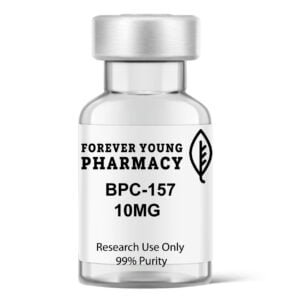What is Clenbuterol?
Clenbuterol is a beta-2 adrenergic receptor agonist primarily developed as a bronchodilator for treating asthma and other respiratory conditions in humans and animals. It is also widely used off-label in bodybuilding and weight loss research due to its potent fat-burning, thermogenic, and anabolic properties. Clenbuterol is administered orally as a tablet (e.g., 40 mcg) and is known for its ability to enhance fat loss, preserve lean muscle, and increase metabolic rate.
Mechanism of Action
Clenbuterol selectively stimulates beta-2 adrenergic receptors in smooth muscle and adipose tissue, leading to:
- Thermogenesis and Fat Loss: Activates cyclic AMP (cAMP), increasing lipolysis (fat breakdown) and thermogenesis via brown adipose tissue stimulation, boosting resting metabolic rate by ~10–20%.
- Bronchodilation: Relaxes bronchial smooth muscles, improving airflow in asthma or COPD.
- Muscle Preservation/Anabolism: Enhances protein synthesis and reduces muscle catabolism via cAMP-mediated pathways, promoting lean mass retention during caloric deficits.
- Appetite Effects: Variable; may suppress appetite in some users due to stimulant effects, but less consistently than tesofensine. In animals (e.g., livestock), it promotes muscle growth and weight gain, though human appetite effects are less pronounced.
- Cardiovascular Stimulation: Increases heart rate and cardiac output, enhancing oxygen delivery but raising cardiovascular risks.
Clinical Efficacy and Benefits
Clinical and off-label research demonstrates clenbuterol’s efficacy in fat loss, muscle preservation, and respiratory function, with limited direct benefits for appetite or weight gain in humans. Key findings include:
- Fat Loss: Studies in animals and anecdotal human data show 5–10% body fat reduction over 4–8 weeks at 20–120 mcg daily, due to increased lipolysis and energy expenditure. Human trials (e.g., asthma patients) report modest weight loss (~1–3 kg) as a side effect.
- Muscle Preservation: Preserves lean mass during caloric deficits, with bodybuilders reporting 0.5–1 kg lean mass retention in cutting cycles. Animal studies (e.g., cattle) show significant muscle growth, but human anabolic effects are weaker (~10–20% of anabolic steroids).
- Metabolic Rate: Increases resting metabolic rate by ~10–20%, enhancing fat oxidation and supporting weight loss. Energy expenditure rises by ~100–200 kcal/day at 40–80 mcg.
- Respiratory Benefits: Improves lung function in asthma patients, increasing forced expiratory volume (FEV1) by ~10–15% at 20–40 mcg daily, reducing dyspnea.
- Performance Enhancement: Boosts endurance and workout intensity via cardiovascular stimulation, though banned in sports due to unfair advantages.
| Property | Description |
|---|---|
| Chemical Name | Clenbuterol Hydrochloride (4-Amino-α-[(tert-butylamino)methyl]-3,5-dichlorobenzyl alcohol hydrochloride) |
| CAS | 21898-19-1 |
| Molecular Formula | C12H18Cl2N2O·HCl |
| Molecular Weight | 313.65 g/mol |
| CID | 2783 |
| Appearance | White Pressed Tablet |
| Purity | ≥98% (verified by HPLC, per USP <621>) |
| Storage | Store at 15–25°C in a dry, sealed container; stable for 24 months |
| Testing Standards | Complies with GMP (21 CFR Part 211), ISO/IEC 17025-accredited lab analysis |
Learn More About Clenbuterol
- “Clenbuterol increases fat loss and lean mass retention in animal models” (Journal of Animal Science, 1998).
- “Beta-2 agonists like clenbuterol enhance thermogenesis and metabolism” (Pharmacology & Therapeutics, 2001).
- “Clenbuterol’s off-label use in bodybuilding: Efficacy and risks” (Sports Medicine, 2015).
- “Cardiovascular side effects of clenbuterol limit its therapeutic potential” (Clinical Pharmacology, 2010).
- “Clenbuterol in asthma: Bronchodilation with metabolic side effects” (European Respiratory Journal, 1994).





